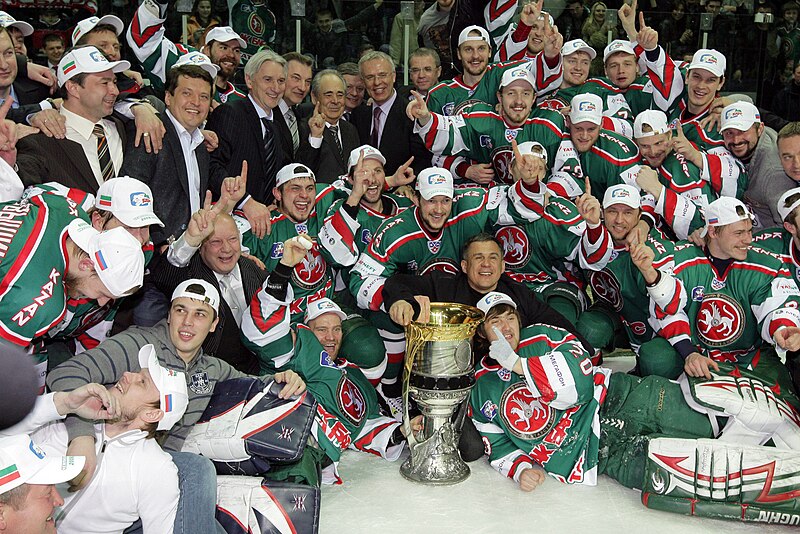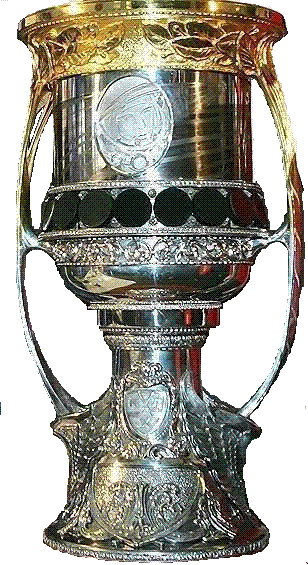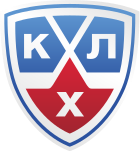The KHL [Kontinental Hockey League] or [Континентальная хоккейная лига] (КХЛ), was set up in 2008 as an international professional league. It comprises 28 member clubs based in Belarus, Croatia, Finland, Kazakhstan, Latvia, Russia and Slovakia and it intends to expand to more countries. It is widely considered to be the premier professional ice hockey league in Europe and Asia, and second in the world behind the NHL.
The league formed from the Russian Superleague (RSL, and the champion of the 2007–08 season of the second division, with 24 teams: 21 from Russia and one each from Belarus, Latvia and Kazakhstan. The teams were divided into 4 divisions, based on the performance in previous seasons. The first season ended in April 2009 with Ak Bars Kazan becoming the first ever winner of the Gagarin Cup. In an effort to reduce the large travel distances for the teams, the second season saw the introduction of two conferences (East and West) and the re-alignment of the divisions according to geographical criteria. In the Gagarin Cup finals, teams from the East dominated with Ak Bars Kazan winning twice and Salavat Yulaev Ufa once. The start of the fourth season was overshadowed by the Yaroslavl air disaster on 7 September 2011 in which almost all members of the team Lokomotiv Yaroslavl lost their lives shortly after take-off for their flight to their season opening game in Minsk. The Opening Cup game in Ufa, which was already under way when news of the disaster arrived, was abandoned and the start of the season postponed by five days. Lokomotiv Yaroslavl was forced to withdraw from the KHL season, but later played part of the VHL season and returned to the KHL in 2012. In memory of the disaster, 7 September remains a day of mourning on which no KHL regular season games are held.

Ak Bars Kazan winning the Gagarin Cup
Season Structure
Since 2009, the league is divided into East and West conferences. In the current season, each conference includes 14 teams divided into two divisions, 7 teams per division. During the regular season, each team plays 60 games: four games against each team in their own division, two games against each of the remaining teams in the same conference, one game against each team of the other conference and 8 extra games against selected opponents. The eight top-ranked teams in each conference receive playoff berths. Within each conference quarterfinals, semifinals and finals are played before the conference winners play against each other for the Gagarin Cup. The division winners are seeded first and second in their conference, based on their regular season record. All playoff rounds are played as best-of-seven series. In each round, the top seeded remaining team is paired with the lowest seeded team etc. In the playoffs, overtime periods last 20 minutes (or until a goal is scored). The number of overtime periods is not limited. In the 2012–13 season, the Nadezhda Cup (Cup of Hope) was introduced, a consolation tournament for the teams who did not qualify for the playoffs. The winning team in the tournament wins the first overall pick in the KHL Junior Draft. The tournament is intended to extend the season and help maintain interest in hockey in the cities of these teams, and help players of national teams prepare for upcoming World Championship.
Division
|
Team
|
City/Area
|
Arena
|
Capacity
|
Founded
|
Joined
|
Head Coach
|
Captain
| |
Western Conference
| |||||||||
Atlant Moscow Oblast
|
Mytishchi Arena
|
7,000
|
1953*
|
2008
| |||||
Dinamo Minsk
|
Minsk-Arena
|
15,000
|
2004
|
2008
| |||||
Dinamo Riga
|
Arena Riga
|
10,300
|
2008
| ||||||
Jokerit Helsinki
|
Hartwall Arena
|
13,349
|
1967
|
2014
| |||||
Medveščak Zagreb
|
Arena Zagreb
|
16,200
|
1961
|
2013
| |||||
SKA Saint Petersburg
|
Ice Palace Saint Petersburg
|
12,300
|
1946
|
2008
| |||||
Slovan Bratislava
|
Ondrej Nepela Arena
|
10,115
|
1921
|
2012
| |||||
Tarasov
|
CSKA Moscow
|
CSKA Ice Palace
|
5,600
|
1946
|
2008
| ||||
Dynamo Moscow
|
Luzhniki Minor Arena
|
8,700
|
1946
|
2008
| |||||
Lokomotiv Yaroslavl
|
Arena 2000
|
9,000
|
1949
|
2008
| |||||
Severstal Cherepovets
|
Ice Palace
|
6,000
|
1956
|
2008
| |||||
Sochi
|
Bolshoy Ice Dome
|
12,000
|
2014
| ||||||
Torpedo Nizhny Novgorod
|
Trade Union Sport Palace
|
5,500
|
1947
|
2008
| |||||
Vityaz Moscow Oblast
|
Vityaz Ice Palace
|
5,500
|
1998*
|
2008
| |||||
Eastern Conference
| |||||||||
Kharlamov
|
Ak Bars Kazan
|
TatNeft Arena
|
10,000
|
1956
|
2008
| ||||
Avtomobilist Yekaterinburg
|
KRK Uralets
|
5,500
|
2006
|
2009
| |||||
Lada Togliatti
|
Lada Arena
|
6,600
|
1976
|
2014
| |||||
Metallurg Magnitogorsk
|
Arena Metallurg
|
7,700
|
1950
|
2008
| |||||
Neftekhimik Nizhnekamsk
|
SCC Arena
|
5,500
|
1968
|
2008
| |||||
Traktor Chelyabinsk
|
Traktor Sport Palace
|
7,500
|
1947
|
2008
| |||||
Yugra Khanty-Mansiysk
|
Arena Ugra
|
5,500
|
2006
|
2010
| |||||
Chernyshev
|
Admiral Vladivostok
|
Fetisov Arena
|
7,500
|
2013
| |||||
Amur Khabarovsk
|
Platinum Arena
|
7,100
|
1966
|
2008
| |||||
Avangard Omsk
|
Omsk Arena
|
10,318
|
1950
|
2008
| |||||
Barys Astana
|
Kazakhstan Sports Palace
|
4,070
|
1999
|
2008
| |||||
Metallurg Novokuznetsk
|
Metallurgists Sports Palace
|
8,040
|
1949
|
2008
| |||||
Salavat Yulaev Ufa
|
Ufa Arena
|
8,400
|
1957
|
2008
| |||||
Sibir Novosibirsk
|
Ice Sports Palace Sibir
|
7,400
|
1962
|
2008
| |||||
Teams that didn’t participate in 2014–2015 season
| |||||||||
HC Donbass
|
Druzhba Arena
|
4,130
|
2005
|
2012
| |||||
Lev Praha
|
Tipsport Arena
|
13,150
|
2012
|
2012
| |||||
Spartak Moscow
|
LDS Sokolniki
|
5,530
|
1946
|
2008
|
Due to Return for 2015-16 Season
| ||||
Though now not as restrictive in maintaining an exclusively Russian composition of players and teams, Russian teams are still not allowed to sign more than five foreign players, while non-Russian teams must have at least five players from their respective country. Foreign goaltenders on Russian teams have a limit regarding total seasonal ice time. Prior to the inaugural season, several KHL teams signed several players from the NHL. A dispute between the two leagues over some of these signings was supposed to have been resolved by an agreement signed on July 10, 2008, whereby each league would honor the contracts of the other, but the signing of Alexander Radulov was made public one day after the agreement (though it was actually signed two days prior to the agreement taking effect), leading to an investigation by the International Ice Hockey Federation. On October 4, 2010, the conflict between the leagues was settled when both signed a new agreement to honor one another's contracts. The league set up rules for the NHL lockout which lasted from 16 September 2012 to 12 January 2013. According to the special regulations, each KHL team was allowed to add up to three NHL players to its roster, among them at most one foreign player. More than 40 NHL players, the majority of them Russians, played in the KHL during the lockout.
The winner of the playoff is awarded the Gagarin Cup, the KHL Champion title and the Russian Champion title, regardless of the country the club represents. The team ranked first in the standings after the regular season, i.e. the winner of the regular season, is awarded the Continental Cup (Кубок Континента, Kubok Kontinenta). The winners of the conference finals are awarded the Eastern Conference Champion Cup (Кубок Победителю конференции Восток, Kubok Pobeditelyu konferentsii Vostok) and the Western Conference Champion Cup (Кубок Победителю конференции Запад, Kubok Pobeditelyu konferentsii Zapad).
The KHL also awards the Opening Cup annually to the winner of the first game between the Gagarin Cup winner and the runner-up of the previous season. On September 10, 2011, three days after the 2011 Lokomotiv Yaroslavl air disaster, the KHL head office decided to honor the deceased in the 2011 Opening Cup.
Season
|
Gagarin Cup Winner
|
Gagarin Cup finalist
|
Continental Cup Winner
|
Top scorer
|
2008–09
|
Ak Bars Kazan
|
Lokomotiv Yaroslavl
|
Salavat Yulaev Ufa* (129 points)
|
Sergei Mozyakin (76 points: 34 G, 42 A)
|
2009–10
|
Ak Bars Kazan
|
HC MVD
|
Salavat Yulaev Ufa (129 points)
|
Sergei Mozyakin (66 points: 27 G, 39 A)
|
2010–11
|
Salavat Yulaev Ufa
|
Atlant Moscow Oblast
|
Avangard Omsk (118 points)
|
Alexander Radulov (80 points: 20 G, 60 A)
|
2011–12
|
Dynamo Moscow
|
Avangard Omsk
|
Traktor Chelyabinsk (114 points)
|
Alexander Radulov (63 points: 25 G, 38 A)
|
2012–13
|
Dynamo Moscow
|
Traktor Chelyabinsk
|
SKA Saint Petersburg (115 points)
|
Sergei Mozyakin (76 points: 35 G, 41 A)
|
2013–14
|
Metallurg Magnitogorsk
|
HC Lev Praha
|
Dynamo Moscow (115 points)
|
Sergei Mozyakin (73 points: 34 G, 39 A)
|
2014–15
|
SKA Saint Petersburg
|
Ak Bars Kazan
|
CSKA Moscow (139 points)
|
Alexander Radulov (71 points: 24 G, 47 A)
|
Season
|
Opening Cup Winner
|
Nadezhda Cup Winner
|
2008–09
|
Salavat Yulaev Ufa
|
Nadezhda Cup not yet introduced
|
2009–10
|
Ak Bars Kazan
| |
2010–11
|
Dynamo Moscow
| |
2011–12
|
Salavat Yulaev Ufa
| |
2012–13
|
Dynamo Moscow
|
Dinamo Riga
|
2013–14
|
Dynamo Moscow
|
Avangard Omsk
|
2014–15
|
Metallurg Magnitogorsk
|
Cancelled due to economic reasons
|
| |||||||||||||||||||||||||||||||||||||||||||||||||||||||||||||||||||||||||||||||||||||||||||||||||||||||||||||||||||||||||||||||||||||||||||||||||||||||||||||||||||||||||||||||||||||||||||||||||||||||||||||||||||||||||||||||||||||||||||||||||||||||||||||||||||||||||||||||||||||||||||||||
The Gagarin Cup is the trophy presented to the winner of the Kontinental Hockey League (KHL) playoffs, and is named after cosmonaut Yuri Gagarin, the first human in space. The Cup was supposedly named after Gagarin because the last possible game of the inaugural KHL season would take place on April 12, the anniversary date of Gagarin's flight. After the end of the KHL's regular season, sixteen teams participate in the playoffs. The 1/8 and quarter-finals were a best-of-five series during the first season, and the semi-finals and finals were a best-of-seven series during the first season. Conferences were established for the second season. Conference quarter-finals are a best-of-five series while the conference semi-finals, conference finals and Gagarin Cup finals are a best-of-seven series. The winner of the final best-of-seven series receives the Gagarin Cup. It has been reported that the Cup weighs 18 kg (40 lbs), making it heavier than the NHL's Stanley Cup. The Cup is made of silver and is gold-plated. According to league commissioner Alexander Medvedev, the Cup was named after Gagarin because Russian citizens associate his name with the achievement of great accomplishments, and the man himself has been described as a symbol of the nation. Additionally, according to the founders of the KHL, his ascent into space serves as a metaphor for the contemporary Soviet breakthrough in hockey. Gagarin himself did play hockey, albeit not at a level comparable to that of the KHL. Another candidate for the namesake of the Cup was longtime HC CSKA Moscow and Soviet national team coach Anatoli Tarasov, considered the "father of Soviet hockey". It was later decided that one of the four divisions would bear his name.


No comments:
Post a Comment